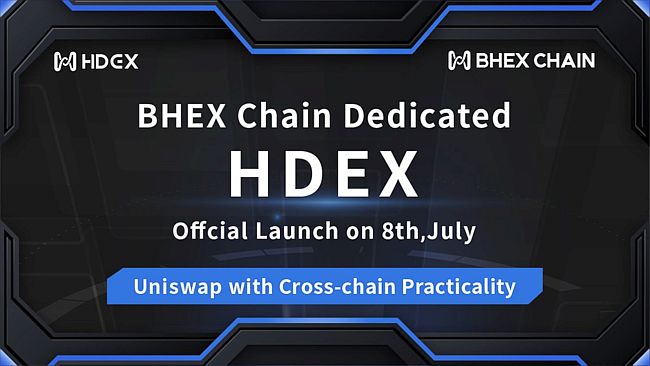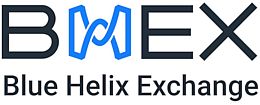BlueHelix Group (BHEX) has released HDEX, the world’s first decentralized trading platform that supports decentralized cross-chain deposit/withdrawal and trading of any asset, on July 8.
HDEX is the perfect landing for BlueHelix’ decentralized financial strategic layout and will continue to empower the BHEX centralized trading platform, BHEX Cloud Saas & Whitelabel solutions, and BHEX Chain in the ecological sectors of BlueHelix Group.

Therefore, through HDEX, users can realize “decentralized cross-chain asset safe deposit and withdrawal, the swap and circulation of any trading pair on-chain, and the rapid transfer of assets between any public chains, truly realizing a complete cross-chain DEX model.”
The innovation and integration of DEX+CEX
As we all know, in the process of digital currency trading in a centralized exchange, the exchange is responsible for the entire transaction process such as custody of funds, providing liquidity, matching transactions, and delivery and clearing. The platform has the absolute right and controls the user’s asset security, users are in a weak position. With the development of DeFi, DEX has risen rapidly, solving many problems of centralized exchanges:
– Asset ownership risk: Users do not need to hold assets in CEX, and assets will be under their own control.
– Regulatory risk: unable to be truly supervised by the government and not affected by policies.
– Trading risk: Users do not need to worry about counterparty and transaction fraud and other issues.
DEX makes up for the deficiency of CEX and meets the actual needs of users. Currently, the market capitalization of some DEX platforms has surpassed CEX, along with the continuously growing trading volume and daily active users.
– Not support the swap between the Native tokens of mainstream assets like BTC;
– Most are based on the AMM model but not OrderBook model
– Low Asset trading efficiency and higher gas fees;
– Unable to realize the liquidity combination between the cross-chain assets;
– Unable to achieve the liquidity sharing between DEXs
HDEX has been committed to changing the existing problems of DEX and CEX since the establishment of the project, and perfectly integrating the advantages of the two. Through HDEX, users can fully share the liquidity and trading depth of any trading pair on any chain, and enjoy the trading experience no less than that of a centralized exchange but also with better user privacy and asset security experiences.
HDEX fully supports the swap of Native tokens. Users can directly swap them into real mainstream public chain tokens such as BTC through HDEX, and withdraw them into their wallets at any time. There is no need to swap the assets issued by centralized organizations on HECO or Binance BSC, which greatly lowers the trust risks of the third parties.
Second, HDEX support the AMM+Orderbook trading mode, with the same liquidity pool;
Traditional DEX adopts the Orderbook mechanism, which is similar to the centralized exchange. However, many orders couldn’t be matched due to the slow trading speed on-chain and small user scale. The occurrence of AMM market-making allows anyone to participate in liquidity providing, with a 3% transition commission bonus, has effectively solved the insufficient liquidity issue in the order book mechanism, which contributes to the growth spurt for the AMM DEXs represented by UniSwap.
However, without the Orderbook model, users of the AMM DEX can only place the orders on market price but not limit orders on CEX. Meanwhile, there will be a large slippage due to the lack of order book function, and orders cannot be filled at a satisfactory price, along with higher gas fees due to the congestion of the Ethereum network.
HDEX decentralized exchange supports both AMM and Orderbook modes. Users can initiate market order transactions or limit order transactions, set buying and selling orders according to the target price, and realize automatic execution, instead of relying solely on AMM prices. Decided. At the same time, it is also convenient for users to gather assets near the transaction price, which greatly improves the utilization rate of funds. In addition, HDEX is also very convenient and compatible with CEX user habits and user experience, which can improve and help CEX users seamlessly switch to DEX.
HDEX Offers Lower Gas fees. It accounts for only less than 2.5% of Ethereum Gas fees. Most users meet high gas fees, lower efficiency, and transaction failure when using Uniswap, and they may need to set a higher slippage and pay expensive gas fees, while with HDEX, these issues will be no longer issues.
Currently, different DEXs have their own liquidity pools based on different smart contracts, but often with insufficient liquidity or market depth. Based on the OpenDEX protocol, HDEX allows any individual/community to develop their own DEX through OpenDEX protocol, while sharing the liquid and the co-construction among all DEXs on chain based on this protocol. At the same time, HDEX also supports customized DEX Settings.
In other words, any individual/community can create a Liquidity pool on HDEX and issue tokens, or remove them at any time. This function will greatly improve the activeness of existing users, greatly enriches the liquidity of the exchanges and increases the volumes, and will contribute to the user growth of the DEX market.
Currently, HDEX has launched the Global Ambassador Recruitment Program, and we welcome all global partners to join. Within the BHEX ecosystem, HDEX is expecting a great future with the recourse, technology, and management support from Bluehelix Group.
Media Contact
Elsa, hdex@bluehelix.com
Official Website: https://hdex.bhexchain.com/
Telegram: https://t.me/hdexofficial
Twitter: https://twitter.com/HdexOfficial
